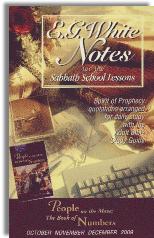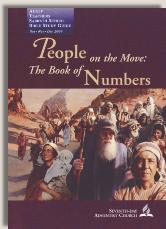|
||||||||||||||
Commentary on "Trumpet, Blood, Cloud, and Fire"
Day 2: Sunday, October 18, 2009
Overview
“Christ is our Passover, our deliverance from sin. What specific activities do we incorporate into our lives to keep that deliverance fresh in our minds? What positive outcomes have we seen as a direct result of repeating our personal history with Jesus for the benefit of others? The posture of the Israelites, when eating the Passover meal, indicated that they were preparing for a journey that would prove to be both painful and difficult. In what ways can our departure (“exodus”) from sin’s bondage lead to pain and difficulty?” (From the Teacher’s Comments section, Adult Sabbath School Bible Study Guide)
Problems
There is a very interesting side story that plays out during the anniversary of the Passover as described in Numbers 9. Alas, the author(s) of this week’s lesson chose to leave it out. Here are the missing verses:
But some of them could not celebrate the Passover on that day because they were ceremonially unclean on account of a dead body. So they came to Moses and Aaron that same day and said to Moses, “We have become unclean because of a dead body, but why should we be kept from presenting the LORD’s offering with the other Israelites at the appointed time?”
Moses answered them, “Wait until I find out what the LORD commands concerning you.”
Then the LORD said to Moses, “Tell the Israelites: ‘When any of you or your descendants are unclean because of a dead body or are away on a journey, they may still celebrate the LORD’s Passover. They are to celebrate it on the fourteenth day of the second month at twilight. They are to eat the lamb, together with unleavened bread and bitter herbs. They must not leave any of it till morning or break any of its bones. When they celebrate the Passover, they must follow all the regulations. But if a man who is ceremonially clean and not on a journey fails to celebrate the Passover, that person must be cut off from his people because he did not present the LORD’s offering at the appointed time. That man will bear the consequences of his sin” (Numbers 9:6-13).
What was God’s response to the “unclean” Israelites regarding Passover? As far as this celebration was concerned, there was so such thing as being unclean. Did you catch that? One of the most important parts of Feast of Unleavened Bread, which immediately followed Passover, was the removal of all leaven from the house (see Exodus 12:14ff). This signified that sin was being removed, because leaven was equated with sin. But God treated those people who were ceremonially unclean due to dealing with a dead body as if they were not unclean, as if they were completely clean. In short, He “passed over” their uncleanness as if it had never happened.
When Adventists, and most other denominations, fail to acknowledge how much Jesus accomplished on the cross, they leave themselves with no other option than to try harder, to work more diligently and, as a result, to fail more miserably.
Specifically, the SDA church teaches that “Christ was standing at the point of transition between two economies and their two great festivals. He, the spotless Lamb of God, was about to present Himself as a sin offering, that He would thus bring to an end the system of types and ceremonies that for four thousand years had pointed to His death” (The Desire of Ages, p. 652). To Adventists, Jesus did nothing more than fulfill the ceremonial portion of the Mosaic Covenant. Yes, He was the sin offering, but only in so far as His offering completed the ceremonial sin offering.
The Bible teaches something much different, much stronger and much more victorious!
“Christ is the end of the law so that there may be righteousness for everyone who believes” (Romans 10:4).
“All this is from God, who reconciled us to himself through Christ and gave us the ministry of reconciliation: that God was reconciling the world to himself in Christ, not counting men’s sins against them. And he has committed to us the message of reconciliation. We are therefore Christ’s ambassadors, as though God were making his appeal through us. We implore you on Christ’s behalf: Be reconciled to God. God made him who had no sin to be sin for us, so that in him we might become the righteousness of God” (2 Corinthians 5:18-21).
“The law is only a shadow of the good things that are coming—not the realities themselves. For this reason it can never, by the same sacrifices repeated endlessly year after year, make perfect those who draw near to worship. If it could, would they not have stopped being offered? For the worshipers would have been cleansed once for all, and would no longer have felt guilty for their sins. But those sacrifices are an annual reminder of sins, because it is impossible for the blood of bulls and goats to take away sins” (Hebrews 10:1-4).
“Day after day every priest stands and performs his religious duties; again and again he offers the same sacrifices, which can never take away sins. But when this priest had offered for all time one sacrifice for sins, he sat down at the right hand of God. Since that time he waits for his enemies to be made his footstool, because by one sacrifice he has made perfect forever those who are being made holy” (Hebrews 10:11-14).
“Then he adds: ‘Their sins and lawless acts I will remember no more.’ And where these have been forgiven, there is no longer any sacrifice for sin. Therefore, brothers, since we have confidence to enter the Most Holy Place by the blood of Jesus, by a new and living way opened for us through the curtain, that is, his body, and since we have a great priest over the house of God, let us draw near to God with a sincere heart in full assurance of faith…” (Hebrews 10:17-22a).
NOTE: I encourage you to read all of Hebrews 10 in order to get the full impact of these incredible promises. In fact, you might as well read all of Hebrews. Take off your Adventist (or Baptist or Methodist or…) blinders and allow the Holy Spirit to revolutionize your life!
These are just a very few of the passages that prove Jesus did so much more than fulfill the ceremonial law. Reread Hebrews 10:1 – “The law is only a shadow…” It does not say the ceremonial law, but “the law”. And that law, with its never-ending sacrifices could never remove sin from the people. Only Jesus could do that, and He did, and by doing so He once and for all completed the entire Old (Mosaic) Covenant, the “ministry that brought death, which was engraved in letters on stone” (2 Corinthians 3:7)!
Before leaving this topic, let me offer some encouragement to those of you who have grown to hate the Lord’s Supper because of your supposed unworthiness. Pull out your Bible and turn to 1 Corinthians 11.
“Therefore, whoever eats the bread or drinks the cup of the Lord in an unworthy manner will be guilty of sinning against the body and blood of the Lord. A man ought to examine himself before he eats of the bread and drinks of the cup. For anyone who eats and drinks without recognizing the body of the Lord eats and drinks judgment on himself” (1 Corinthians 11:27-29).
While growing up in the Adventist church I can’t tell you how many of the adults I knew quoted these verses as the reason for their not partaking in the Lord’s Supper. Instead of doing something in an unworthy manner that they thought would bring judgment on themselves, they stood outside or in the foyer talking about work, sports, camping trips – anything other than what the Lord’s Supper could have meant to them.Talk about having things all upside down and backwards!
However, if we look just a little deeper I think Paul makes abundantly clear what he means. For example—
“In the following directives I have no praise for you, for your meetings do more harm than good. In the first place, I hear that when you come together as a church, there are divisions among you, and to some extent I believe it. No doubt there have to be differences among you to show which of you have God’s approval. When you come together, it is not the Lord’s Supper you eat, for as you eat, each of you goes ahead without waiting for anybody else. One remains hungry, another gets drunk. Don’t you have homes to eat and drink in? Or do you despise the church of God and humiliate those who have nothing? What shall I say to you? Shall I praise you for this? Certainly not!” (1 Corinthians 11:17-22).
What was the “unworthy manner” Paul meant in Verse 27? It was people who came early, ate all the food and drank all the wine (actually getting drunk). They were causing divisions in the church. They were despising the body of Christ – the ecclesia, or “called out ones.” They were humiliating those who had nothing.
There is NOTHING here about unconfessed sin. There is NOTHING here about “getting right with God” so you don’t eat and drink damnation on yourself.
The Lord’s Supper is supposed to be an unmitigated celebration of Jesus’ total and complete victory over sin. It should be a joyous occasion. There should be singing and shouting and even dancing in the aisles. And why not?! Jesus took away sin, once and for all, when He died on the cross. He took away the sin of the entire world. He took away all sin, from Adam and Eve to the end of time as we know it. How many of your sins were in the future when He died? ALL OF THEM! And Jesus took them all away.
This is one of the two greatest differences between the Old and New Covenants. Under the Old, sin always was an issue, because the blood of bulls and goats never could take it away. Under the New, sin never is an issue. Jesus took all of it, so there is none left for you and me to bear. Under the Old, no one except the High Priest dared venture into the Holy of Holies. Under the New, all are invited to boldly enter the throne room of heaven, the ultimate Holy of Holies. This could not be possible if any sin remained to separate us from God. No one is unclean anymore.
Summary
- Because of what Jesus accomplished on the cross, sin no longer stands between us and God.
- This means that Jesus is much more than the Passover lamb of the Israelites. He quite literally took away sin.
- Now we can enter the very throne room of heaven with boldness and thanksgiving. There is no fear in love.
- Rather than the depressing affairs most churches make of the Lord’s Supper, it should be one of the most joyous celebrations we have.
Copyright 2009 BibleStudiesForAdventists.com. All rights reserved. Revised October 15, 2009. This website is published by Life Assurance Ministries, Glendale, Arizona, USA, the publisher of Proclamation! Magazine. Contact email: BibleStudiesForAdventists@gmail.com.
The Sabbath School Bible Study Guide and the corresponding E.G. White Notes are published by Pacific Press Publishing Association, which is owned and operated by the Seventh-day Adventist church. The current quarter's editions are pictured above.
Official Adventist Resources
Standard Edition Study Guide Week 4
Teacher's Edition Study Guide Week 4
Easy Reading Edition Study Guide Week 4
Search the Complete Published Ellen G. White Writings


